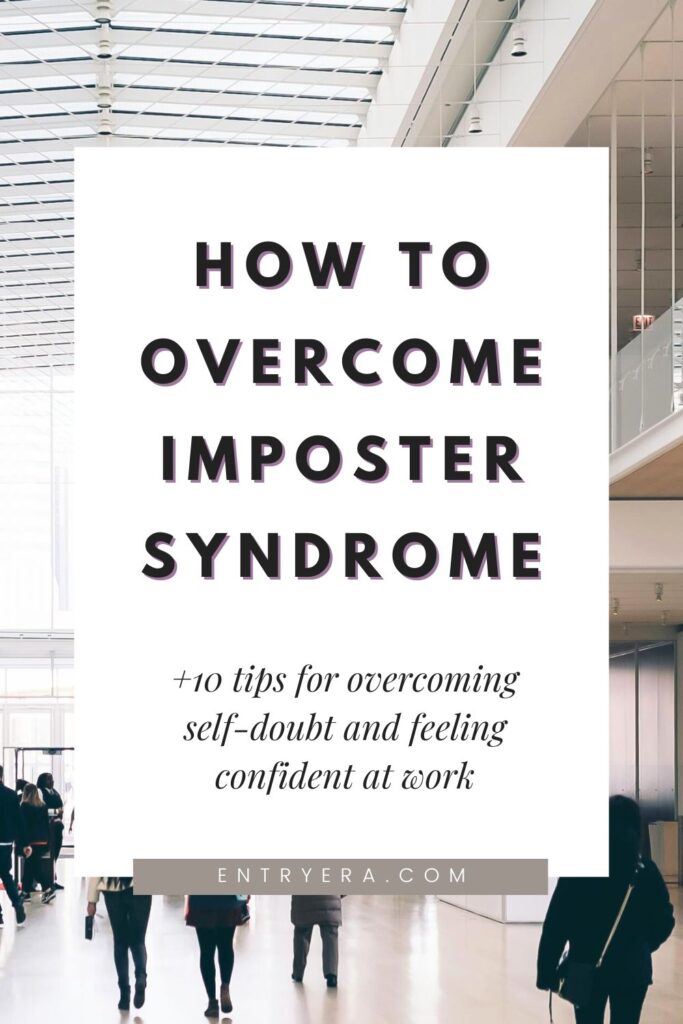At 24, I unexpectedly became Head of Marketing for my B2B tech start-up. Fresh out of college with just two years of experience, I felt way out of my depth. Hello, imposter syndrome! But don’t worry – I’ve figured out how to handle it like a pro.
Here’s the thing: imposter syndrome is super common. It can sneak up on anyone, regardless of their job. The good news? It’s all in your mind! You’re in your position because you earned it. So let’s celebrate your wins and keep growing.
Ready to tackle imposter syndrome head-on? We’ll explore what it is, how it affects you, and best of all, how to boost your confidence at work. Remember, even the best of the best had to start somewhere.

What is imposter syndrome?
Imposter syndrome is a psychological pattern where you doubt your abilities and feel like a fraud despite evidence of your competence. It’s that nagging feeling that you don’t deserve your achievements or position.
People with imposter syndrome often worry they’ll be “found out” as unqualified or undeserving. This mindset can lead to stress, anxiety, and a reluctance to pursue new opportunities.
Remember, though, that imposter syndrome isn’t a reflection of your actual abilities – it’s just an internal struggle that many high-achievers face.
What causes imposter syndrome?
Imposter syndrome is often caused by a mix of internal and external factors. Perfectionism, fear of failure, and low self-esteem can contribute to these feelings of inadequacy. Family dynamics, like high parental expectations or being labeled as the “smart one,” can also play a role.
New challenges or transitions, such as starting a new job or getting a promotion, frequently trigger imposter syndrome. Social comparisons, especially in competitive environments or on social media, can amplify these doubts.
It’s important to recognize that these feelings don’t stem from a lack of ability, but from how we interpret our experiences and successes.
How common is imposter syndrome?
Imposter syndrome is surprisingly common, affecting people across all career stages and fields. Research suggests that up to 70% of people experience imposter feelings at some point in their lives.
It’s especially prevalent in high-achieving individuals and those in competitive industries. Many successful people, including award-winning actors, best-selling authors, and top executives, have openly discussed their struggles with imposter syndrome.
The widespread nature of this phenomenon shows that you’re definitely not alone if you’re experiencing these feelings. Recognizing how common it is can be the first step in overcoming imposter syndrome.
Who is most likely to experience imposter syndrome?
While imposter syndrome can affect anyone, certain groups tend to experience it more frequently. High achievers and perfectionists are particularly prone to these feelings. Women and minority groups often report higher rates of imposter syndrome, especially in fields where they’re underrepresented.
Related article: Shattering the Glass Ceiling: Strategies for Women in Leadership
First-generation professionals or students may also struggle more with feelings of belonging. People in creative or subjective fields, where success isn’t easily measured, can be vulnerable to imposter feelings.
Recent graduates or those experiencing career transitions are likely to face imposter syndrome as they adjust to new roles. It often affects the most capable and ambitious individuals!
What are the signs of imposter syndrome?
The signs of imposter syndrome include:
- Constant self-doubt and feeling like a fraud
- Attributing success to luck or external factors
- Fear of being “found out” or exposed as incompetent
- Difficulty accepting praise or downplaying achievements
- Setting unrealistically high standards for yourself
- Overworking to prove your worth
- Feeling like you don’t belong or aren’t qualified for your position
These signs can vary in intensity and frequency from person to person. Recognizing these symptoms is the first step in addressing imposter syndrome.

How does imposter syndrome manifest in daily life?
Imposter syndrome can sneak into your daily life in surprising ways. You might find yourself over-preparing for meetings or presentations, afraid that any small mistake will expose you as a fraud.
Turning down opportunities or avoiding challenges becomes common, as the fear of failure looms large. You might also catch yourself deflecting compliments or attributing your successes to external factors.
In team settings, you may hesitate to share ideas or speak up, worried that your contributions aren’t valuable enough. These daily manifestations can be exhausting.
Can imposter syndrome affect career growth?
Absolutely, imposter syndrome can put a real damper on your career growth. It often leads to self-sabotaging behaviors like turning down promotions or not applying for jobs you’re qualified for.
You might avoid networking opportunities or speaking engagements, missing out on valuable connections and visibility. Imposter syndrome can also hinder your ability to negotiate salaries or ask for raises, as you may feel undeserving of better compensation.
The constant self-doubt can slow down decision-making and reduce risk-taking, both of which are often crucial for career advancement.
Is imposter syndrome more prevalent in certain industries or fields?
While imposter syndrome can appear up in any field, it does tend to be more common in certain industries. High-pressure, competitive environments like tech, finance, and academia often see higher rates of imposter syndrome.
Creative fields, where success is subjective and criticism is frequent, also tend to breed these feelings. Industries with rapid change or innovation can trigger imposter syndrome as people struggle to keep up. Fields with underrepresented groups, like women in STEM or minorities in executive roles, often report higher instances of feeling like an imposter.
Remember, though, no matter your industry, you’re not alone in these feelings – and they don’t define your capabilities or worth.
Related article: Best Work Life Balance Jobs: Work Smarter, Live Better
How to know if you have imposter syndrome
You might have imposter syndrome if you constantly doubt your abilities despite evidence of your success. Do you often feel like a fraud, worried that others will “discover” you’re not as competent as they think?
Are you quick to attribute your achievements to luck or external factors rather than your own skills? If you find yourself overworking to prove your worth or struggling to accept compliments, these could be signs of imposter syndrome.
Take a moment to reflect on your thoughts and behaviors – if these patterns sound familiar, you might be dealing with imposter syndrome.
What are the long-term effects of untreated imposter syndrome?
Untreated imposter syndrome can have significant long-term effects on your personal and professional life. It can lead to chronic stress and burnout as you constantly push yourself to “prove” your worth.
Your career growth may stagnate if you consistently avoid new opportunities or challenges due to self-doubt. Relationships can suffer as you struggle to accept praise or support from others.
Over time, imposter syndrome can erode your self-esteem and confidence, making it harder to advocate for yourself or pursue your goals.
However, the good news is that with awareness and the right strategies, you can overcome these effects and reclaim your confidence.
Can imposter syndrome lead to anxiety or depression?
Yes, imposter syndrome can indeed lead to anxiety or depression if left unchecked. The constant self-doubt and fear of being “found out” can create a persistent state of anxiety. The pressure to maintain a facade of competence can be emotionally exhausting.
If imposter feelings persist, they may contribute to feelings of hopelessness or low self-worth, which are hallmarks of depression. The stress of living with imposter syndrome can also exacerbate existing mental health conditions.
It’s important to address these feelings early on – talking to a trusted friend, mentor, or mental health professional can be a great first step in managing imposter syndrome and protecting your mental health.
Does imposter syndrome go away?
While imposter syndrome doesn’t typically vanish overnight, the good news is that it can definitely be managed and often significantly reduced. For many people, imposter feelings tend to lessen with time and experience as they build confidence in their abilities.
However, it’s not just about waiting it out – actively working on recognizing and challenging imposter thoughts can speed up the process. Learning to celebrate your achievements, reframing negative self-talk, and seeking support from others are all effective strategies.
Even if imposter feelings expose themselves from time to time (especially when facing new challenges), you’ll be better equipped to handle them with practice.

How to overcome imposter syndrome
Overcoming imposter syndrome is a journey, but it’s definitely possible with the right strategies. Start by acknowledging your feelings and challenging those pesky negative thoughts. Celebrate your successes, no matter how small, and focus on personal growth rather than perfection.
Seek support from others and practice self-compassion. Building confidence is like working out a muscle – it gets stronger with consistent practice!
10 tips for overcoming imposter syndrome
Here are 10 effective strategies to help you tackle imposter syndrome head-on. These tips range from internal mindset shifts to external actions, giving you a well-rounded approach to building confidence and silencing your inner critic.
1. Acknowledge your feelings
The first step in tackling imposter syndrome is simply recognizing it. When you feel like a fraud, pause and name that feeling. Say to yourself, “This is imposter syndrome talking.” Just identifying these thoughts can reduce their power over you. It’s like turning on a light in a dark room – suddenly, those scary shadows (your doubts) don’t seem so big anymore.
2. Challenge negative thoughts
When self-doubt creeps in, it’s time to play detective. Look for evidence that contradicts your negative beliefs. Have you received positive feedback? Completed challenging projects? Helped others?
Keep a list of your accomplishments and skills to review when imposter feelings strike. Your thoughts aren’t always facts – challenge them with evidence of your competence.
3. Share your feelings
Talking about imposter syndrome can feel scary, but it’s incredibly powerful. Open up to trusted friends, colleagues, or a mentor about your feelings. You’ll likely find that many others have similar experiences. Their support and perspective can help you see things more clearly. Plus, bringing these feelings into the light often reduces their intensity.
4. Celebrate your successes
Don’t brush off your achievements! Take time to acknowledge and enjoy your successes, big and small. Keep a “win list” or a folder of positive feedback to review when you need a confidence boost. Celebrating your accomplishments isn’t bragging – it’s recognizing your hard work and abilities. So go ahead, do a little victory dance when you reach a goal!
5. Set realistic expectations
Perfectionism and imposter syndrome often go hand in hand. Instead of aiming for flawless performance, set realistic, achievable goals. Remember that making mistakes is a normal part of learning and growth. Focus on progress, not perfection. Each step forward, no matter how small, is a win worth celebrating.
6. Focus on personal growth
Instead of obsessing over being the “best,” concentrate on your own progress and learning. Embrace challenges as opportunities to develop new skills and knowledge. Keep a growth mindset by asking yourself, “What can I learn from this?” rather than “What if I fail?”
Remember, everyone starts as a beginner. Your journey of improvement is what matters most, not how you compare to others at any given moment.
7. Avoid comparisons
Comparing yourself to others is a fast track to imposter syndrome. Everyone’s path is different, and you’re only seeing their highlight reel, not their behind-the-scenes struggles. When you catch yourself comparing, redirect your focus to your own progress. Celebrate others’ successes without diminishing your own.
8. Seek support and mentorship
You don’t have to face imposter syndrome alone. Find a mentor or join a support group in your field. These connections can provide valuable guidance, reassurance, and perspective. A good mentor can help you see your strengths more clearly and provide strategies for professional growth.
Related article: Should You Be Attending Networking Events? The Importance of Connections
Plus, hearing about others’ experiences with imposter syndrome can remind you that these feelings are common, even among highly successful people.

9. Practice self-compassion
Be as kind to yourself as you would be to a good friend facing self-doubt. When you make a mistake or face a setback, respond with understanding and encouragement rather than harsh self-criticism.
Remind yourself that everyone has moments of uncertainty and that doesn’t diminish your worth or abilities. Treat yourself with patience and kindness as you work on building your confidence.
10. Continue learning
Embrace a growth mindset by continuously expanding your knowledge and skills. Take on new challenges, attend workshops, read widely in your field, or learn from colleagues.
This not only boosts your competence but also reminds you that everyone is always learning and improving. Embrace the learning process and give yourself credit for stepping out of your comfort zone.
How can you support someone dealing with imposter syndrome?
Supporting someone with imposter syndrome involves listening, validating their feelings, and offering gentle reminders of their accomplishments. Encourage them to talk about their doubts without judgment, and share your own experiences if you’ve dealt with similar feelings.
Help them challenge their negative self-talk by pointing out evidence of their competence and successes. Offer specific, genuine praise for their skills and achievements, and remind them that it’s okay to make mistakes or ask for help.
If you know of someone who is struggling, your support can make a big difference in helping them build confidence and overcome their imposter feelings.
Know your worth, and be proud!
Trust me, I know what it’s like feeling like an imposter in your job. But don’t let those doubts hold you back from achieving your goals and feeling proud! Your worth goes beyond your job or achievements – it’s about your character, growth, and positive impact on others.
Celebrate your successes and share them. Embracing your worth isn’t arrogance; it’s about healthy confidence. So stand tall, own your abilities, and be proud of who you are and what you bring to the table!







